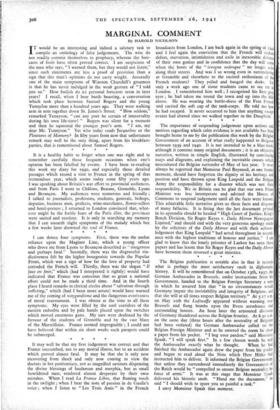I can detect four symptoms. First, there was the undue
reliance upon the Maginot Line, which a young officer who drove me from Lyons to Besancon described as " dangerous and perhaps fatal." Secondly, there was the disgraceful vin- dictiveness felt by the higher bourgeoisie towards the Popular Front, which was a sign of how far the love of property had corroded the French will. Thirdly, there was the slogan Taut en finir," which (had I interpreted it rightly) would have indicated that France was conscious that so great a national effort could not be made a third time. And in the fourth place I heard remarks in clerical circles about " salvation through suffering," which (had I been more astute) would have warned me of the coming of weygandisme and the dangerous evasiveness of moral rearmament. I was obtuse at the time to all these symptoms. My eyes were filled by the cool corridors of the eastern redoubts and by pale hands placed upon the switches which moved enormous guns. My ears were deafened by the fervour of the students of Grenoble and by the vast blare of the Marseillaise. France seemed impregnable ; I could not have believed that within six short weeks such parapets could be submerged.
* * * *


























 Previous page
Previous page